
Meet the hottest name in genre: Zushe Band
Three American-Chassidish guys fill up halls, on their way to conquer the world • Video of fascinating interview, and clip of historical concert - Watch
- Kobi Har Tzvi
- א' שבט התשע"ו
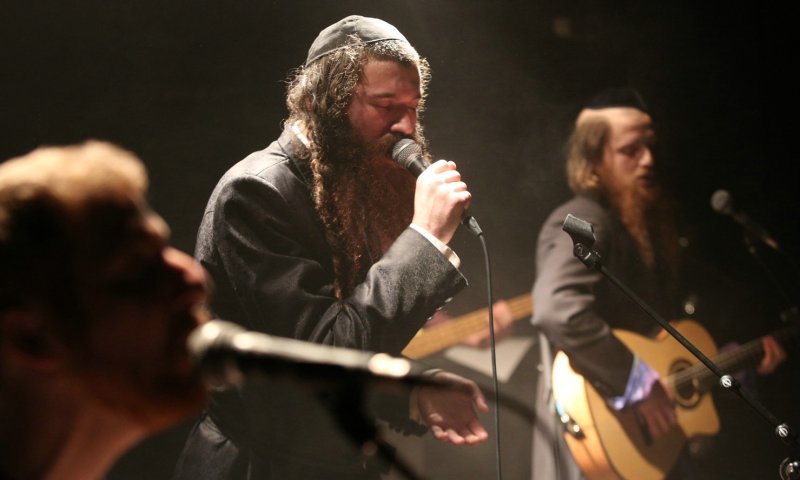
קובי הר צבי
Last Saturday night. Another chilly night in Jerusalem. In the Talpiot neighborhood gather more than 200 religious and Haredi teenagers, mostly of American origin, but not only. They came to hear one of the most colorful bands seen here recently. The hall filled to capacity, energies reach the heavens. Oxygen is thin, but that does not disturb the young revelers. Well, "Zushe" is on stage.
Most of you probably have not heard of Zushe. A trio of American friends from a remote village not far from New York, they met by chance one Shabboa a year ago, and since then it's history. The three - Elisha Mendi Moltek, Zecharya Goldschmidt and Shlomo Arye Gissin, are now in Israel on tour, and tonight is their last performance, after which they fly back across the ocean.
Outside the performance hall CDs and accessories of the band are sold. On stage, the mesmerizing trio performs, accompanied by other instruments. The audience is with them, that's quite obvious. There is, in this music, something mystical. Some of the audience closes its eyes in concentration, others are flushed to the end. Rhythms change, scales change from D minor to La Major, but the dveikus is always there. They manage to enchant for two hours, the audience knows all the hits of "Zushe", with 'Mashiach', the band's flagship song, reigning above all. There is no doubt that this spectacular phenomenon obliges one to understand its roots properly.
I meet them shortly before the performance, at the artists' cramped room of "Yellow Submarine", a place that ordinarily hosts regular concerts for the general public. Tonight it's hosting "Zushe". The trio sits down on the mysterious neon-lit couch, and gives a different and unique interview to Behadrey Haredim.
"The name Zushe, named in honor of Rebbe Zushe of Anipoli," begins Zecharya Goldschmidt, "the special stories attributed to him spoke to us very much. We got a whole Torah from him, each one is something special, and something unique, so, whoever you are - our story is this: to be special, to live together but not forget that each one is something special."
At this stage of the interview, they are joined by two other band members. They sit gently by Zechariah, and chant in two voices the melody of the Baal Shem Tov. A soft and precise performance, used as background music, fascinating behind Zechariah's words. When Zechariah finishes his answer, the tune becomes a big light, and all members join together in singing. They sing a clean, polished tune, with few voices, painfully accurate.
When you hear the unique music of "Zushe", one finds a fascinating mix of Jewish music with world music, reggae jazz and folk. To the Israeli – Haredi ear, Zushe's music would be a bit difficult to digest for the first time, as it causes an ambivalent attitude: on the one hand orthodox Jews who sing words from the scriptures with lots of fire in their eyes, but on the other hand combine motifs that are unknown in the Chassidic field of "Yada'ati" or "Hastora".
"First of all we are good friends," says Shlomo Arye, who is the band's singer. "Before anything else, after all, and all in all," says Zechariah. "We make music of a Hasidic soul," they suggest, "Melodies whose good point is their root. Simple melodies of the soul. People out there find it difficult to accept the simple stuff. Smart people are familiar with many things and complicated wisdoms - but lose the simplest thing: faith in Hakadosh Baruch Hu. That's the main thing, it's the soil of our lives. Even the Gemora in Brachos says that things which are lofty, like prayer, are disdained by people."
When I tell Sholomo Arye says he's responsible for most of the music of the band, he becomes modest. "He's a composer", says the lead singer as a gesture with his finger up, "He is both the King of the universe and the composer of the world, we're just trying to be a conduit to pass it on".
Zushe refuse to mark a clear target audience - "We are catering to the Mevakshei Hashem, audiences that want. Everyone who wants - we want. We do not force anyone to hear us. Whoever finds our music speaks to him - we talk to him." At this point, the members refer to the various splits in the Jewish and Haredi community: "Our direction is to make music speak for all Jews. We are trying to connect everyone to the golden road." This is the trait of Tiferet, like Yaakov Avinu. Just as in tragic situations in history, the enemies yimach shemam, like Hitler, did not make a distinction between one Jew and another, so too in good cases, lehavdil, we need to remember that no matter where we come from, we come from Hashem, that's the important thing. We are one family. How can one make a distinction between Jews at all, to make "Agudos, agudos" - that is, in fact, exile. We do not understand how one can discriminate between Jews. That is invalid".
This answer makes me see the outer difference between the band members: Goldschmidt and Gissin look Breslev Hasidim in all respects, while Moltek, the third band member, has a knitted kippa. They take the matter jokingly and exchange kippas. "What does it matter, why look on the outside," they say, and Moltek presses to his cheek the curling peyos of Gisin: "Is it okay now?" He jokes. "The most important is the pnimius, everything else isn't of interest, our goal is to create unity, it's our daily goal".
"We will be happy to appear before the Haredi community, and to present our music in a pleasant way," they say. "For Klal Israel we are willing to do anything. We'll also be happy to perform in Beis Hamikdosh".
the zusha's show in jerusalem. photo by kobi har tzvi
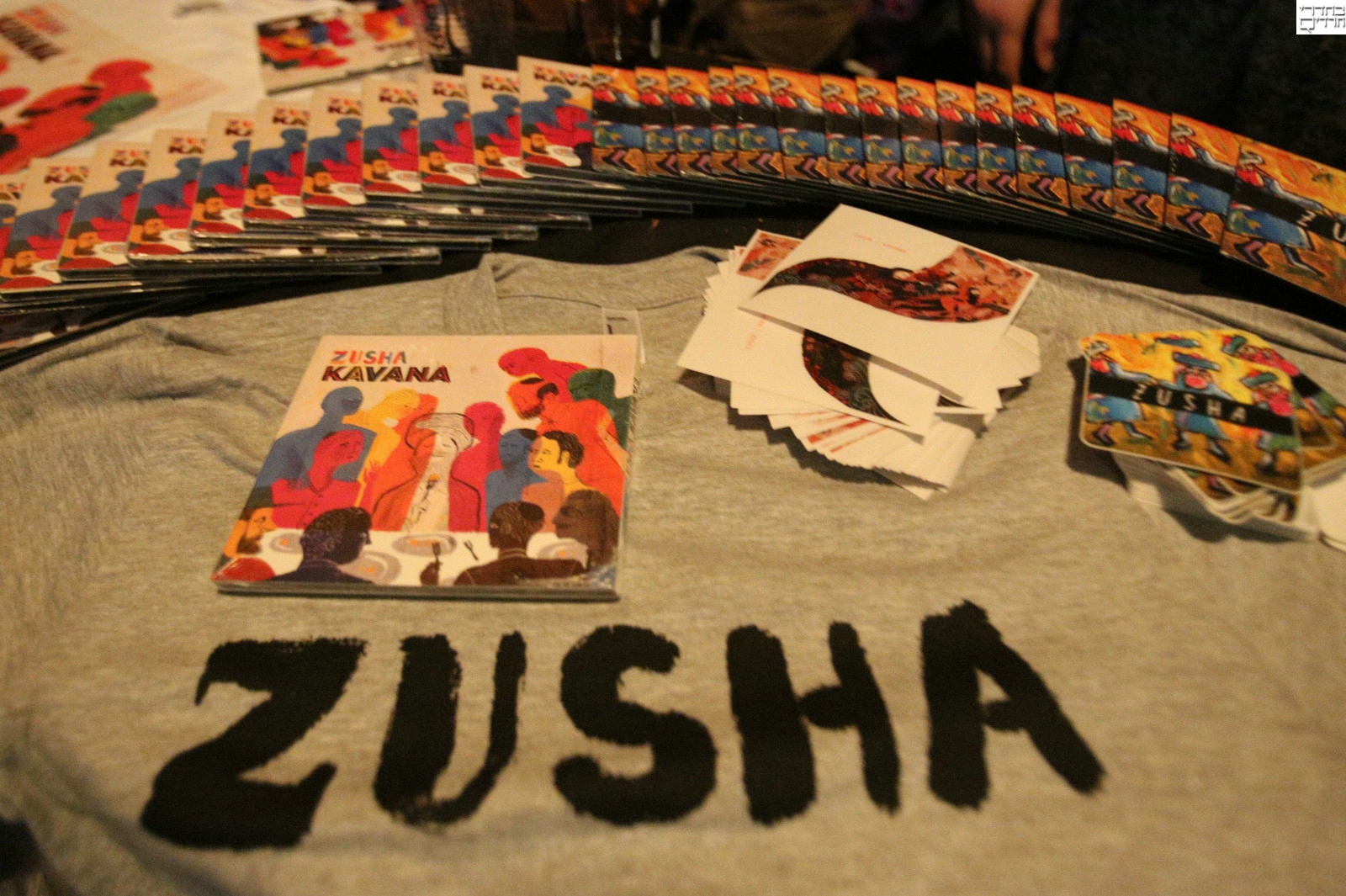
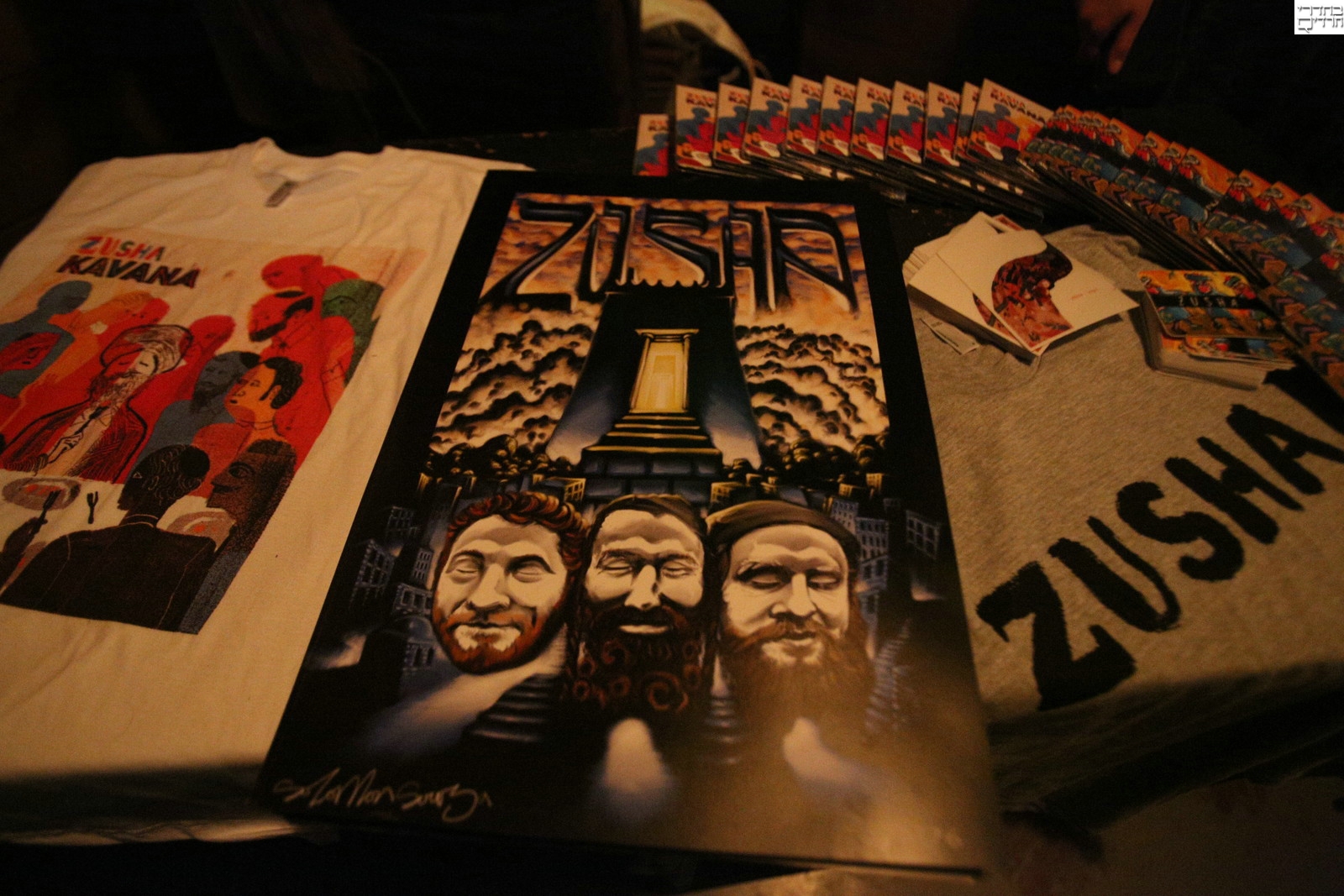
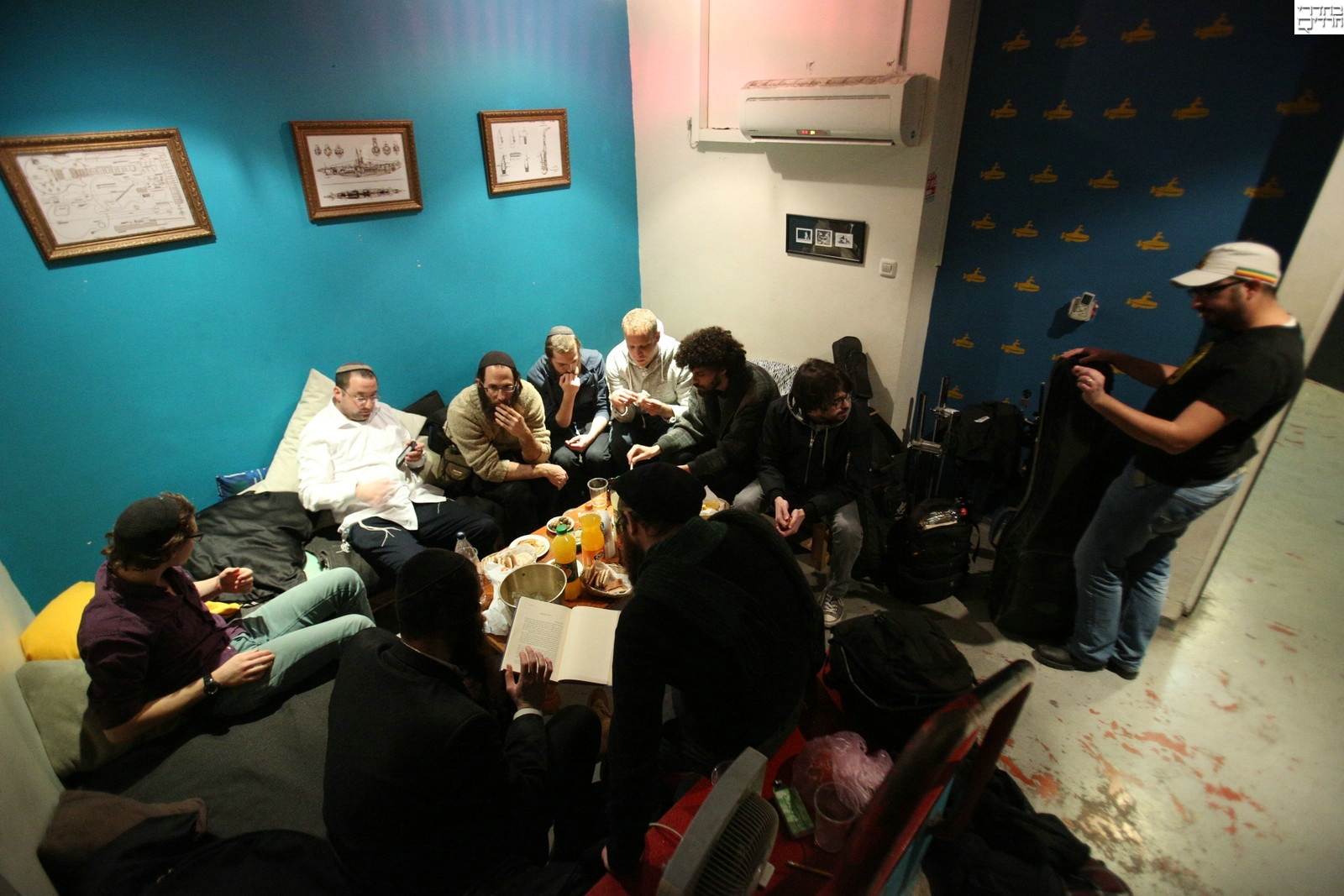

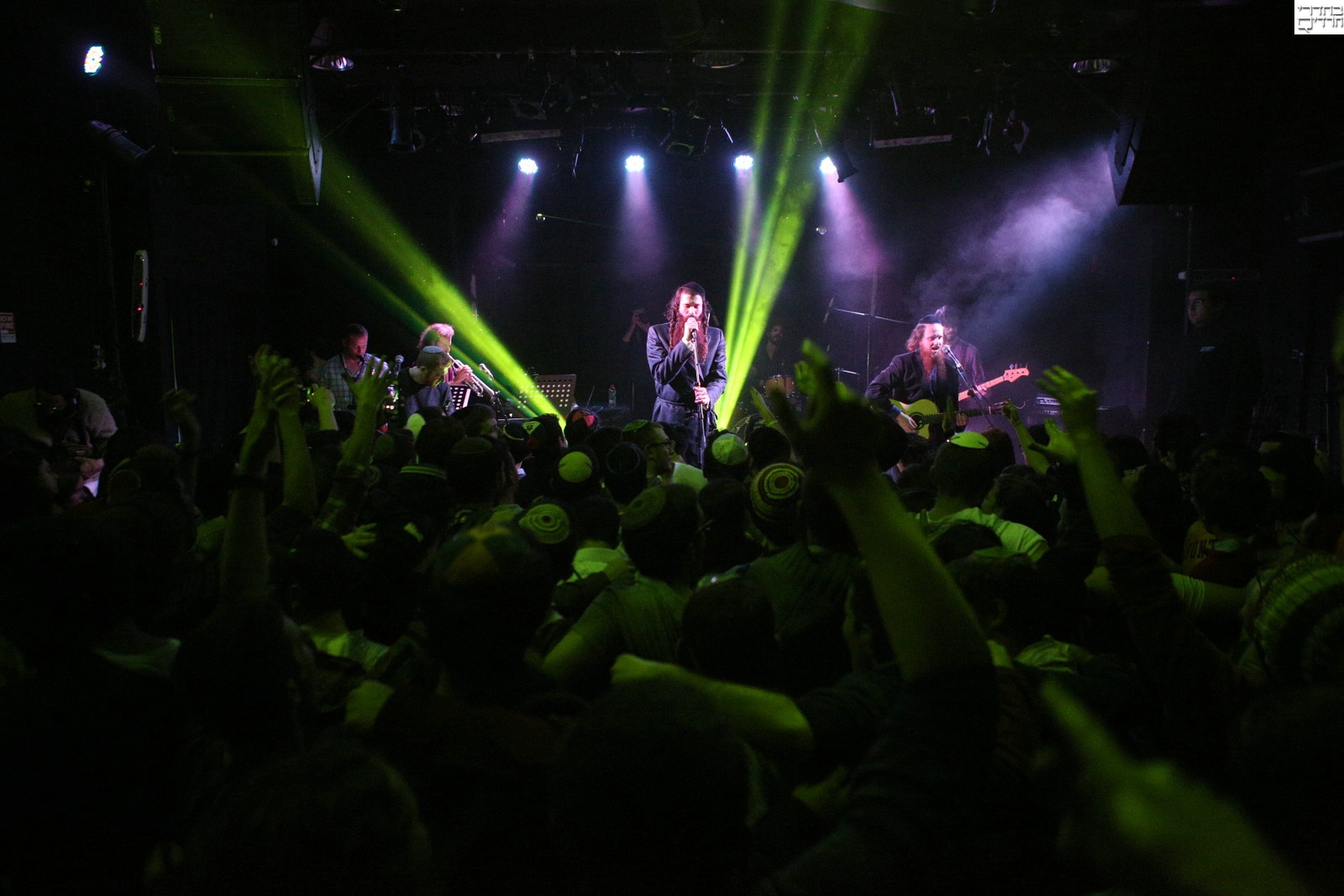
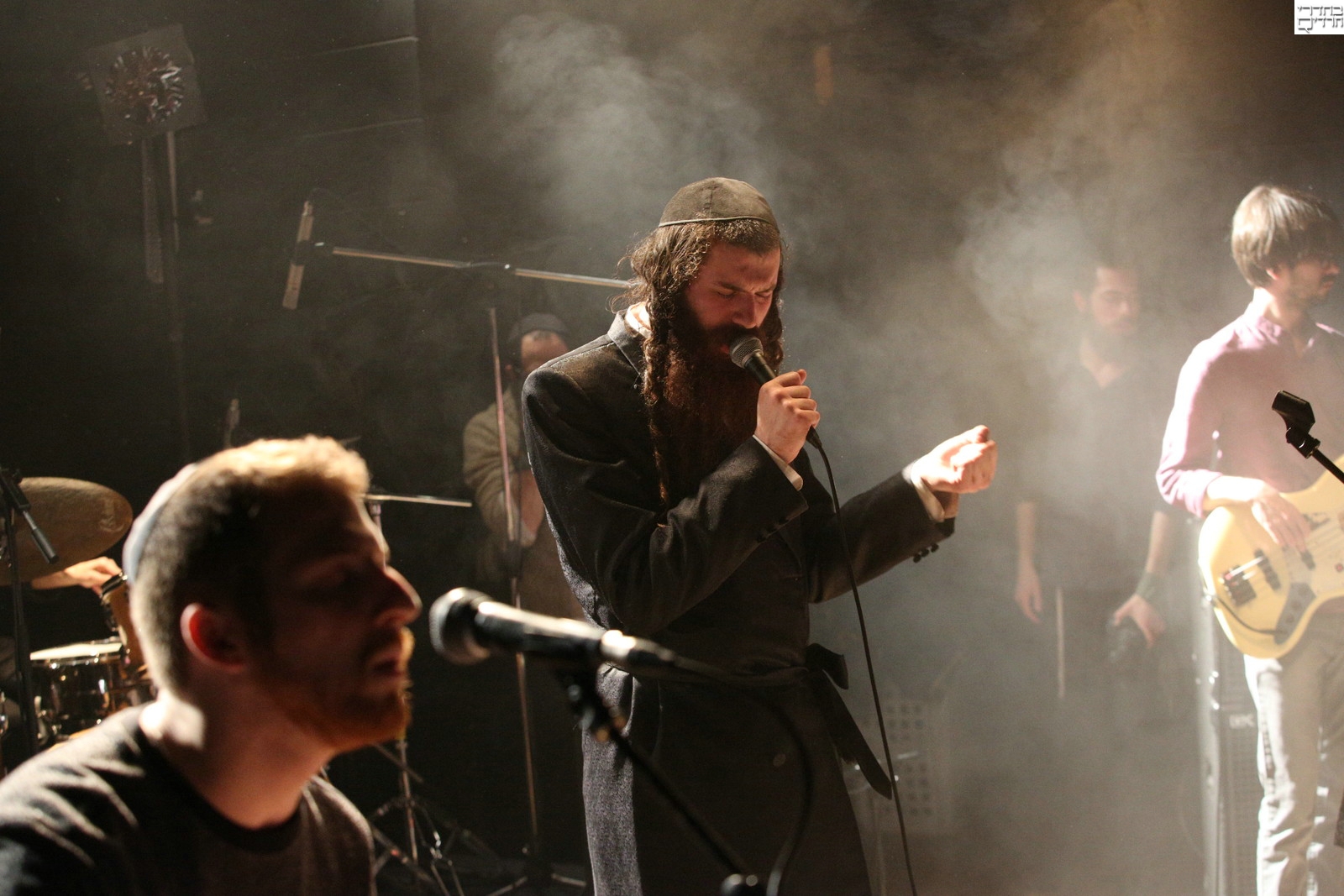
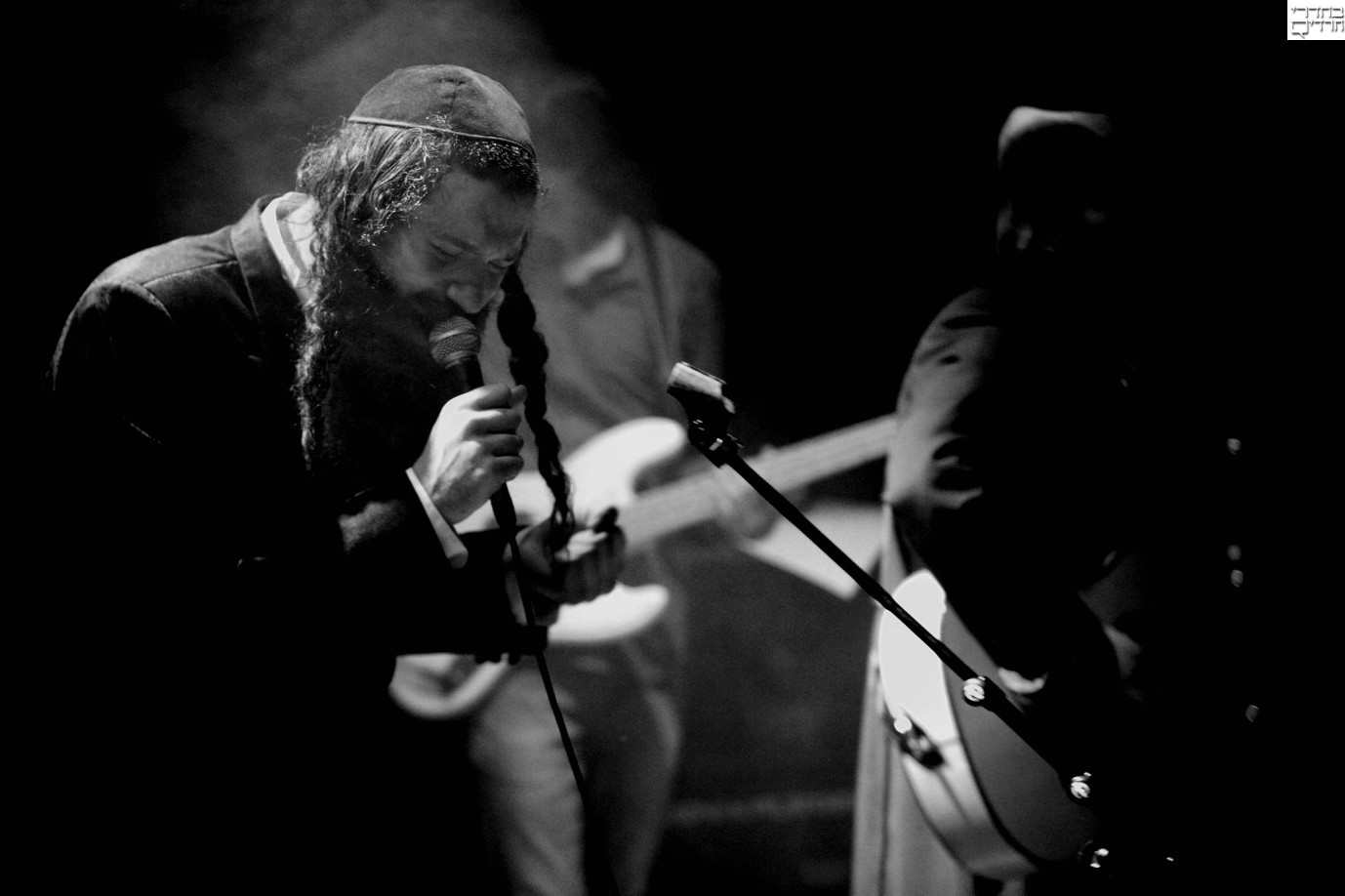
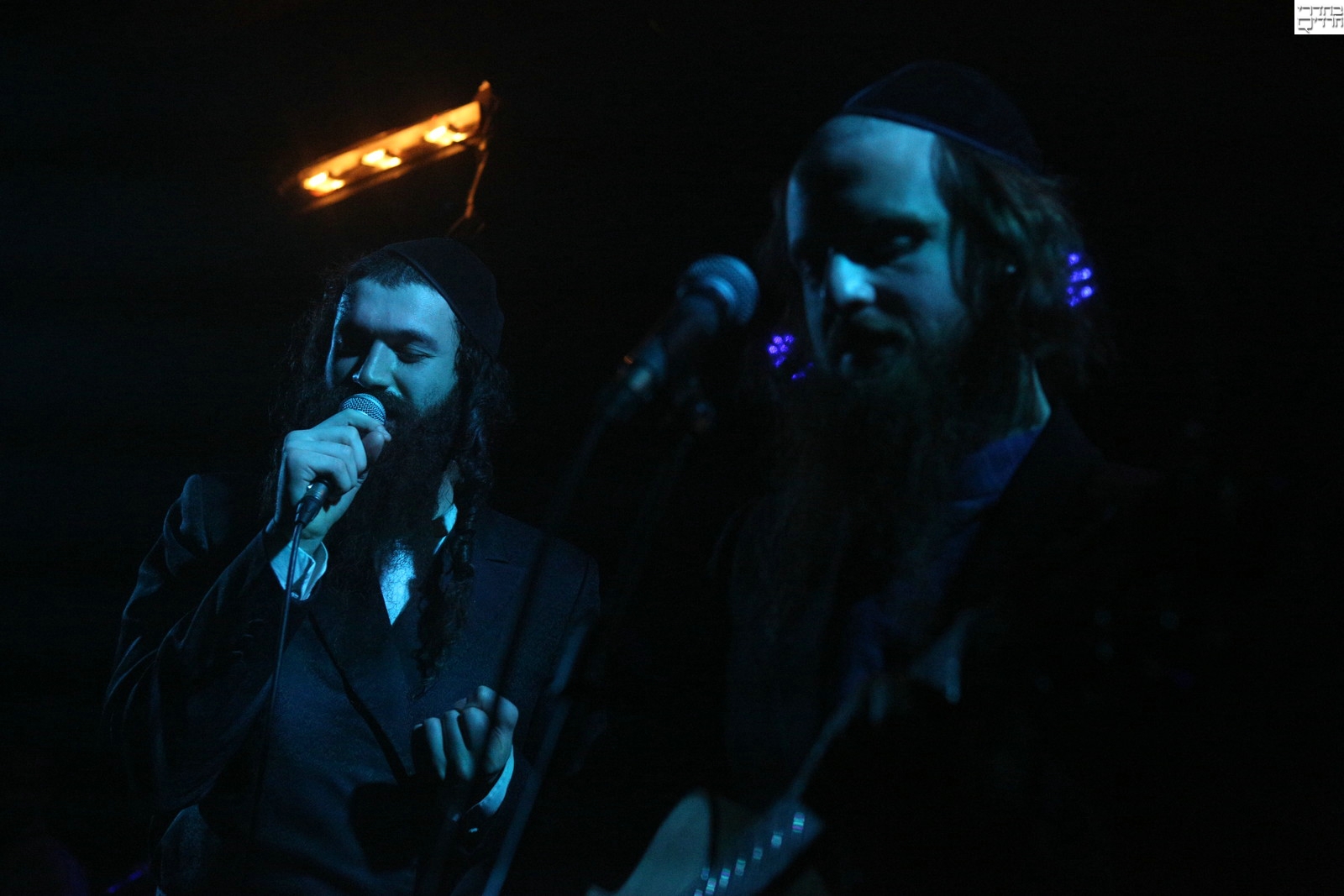
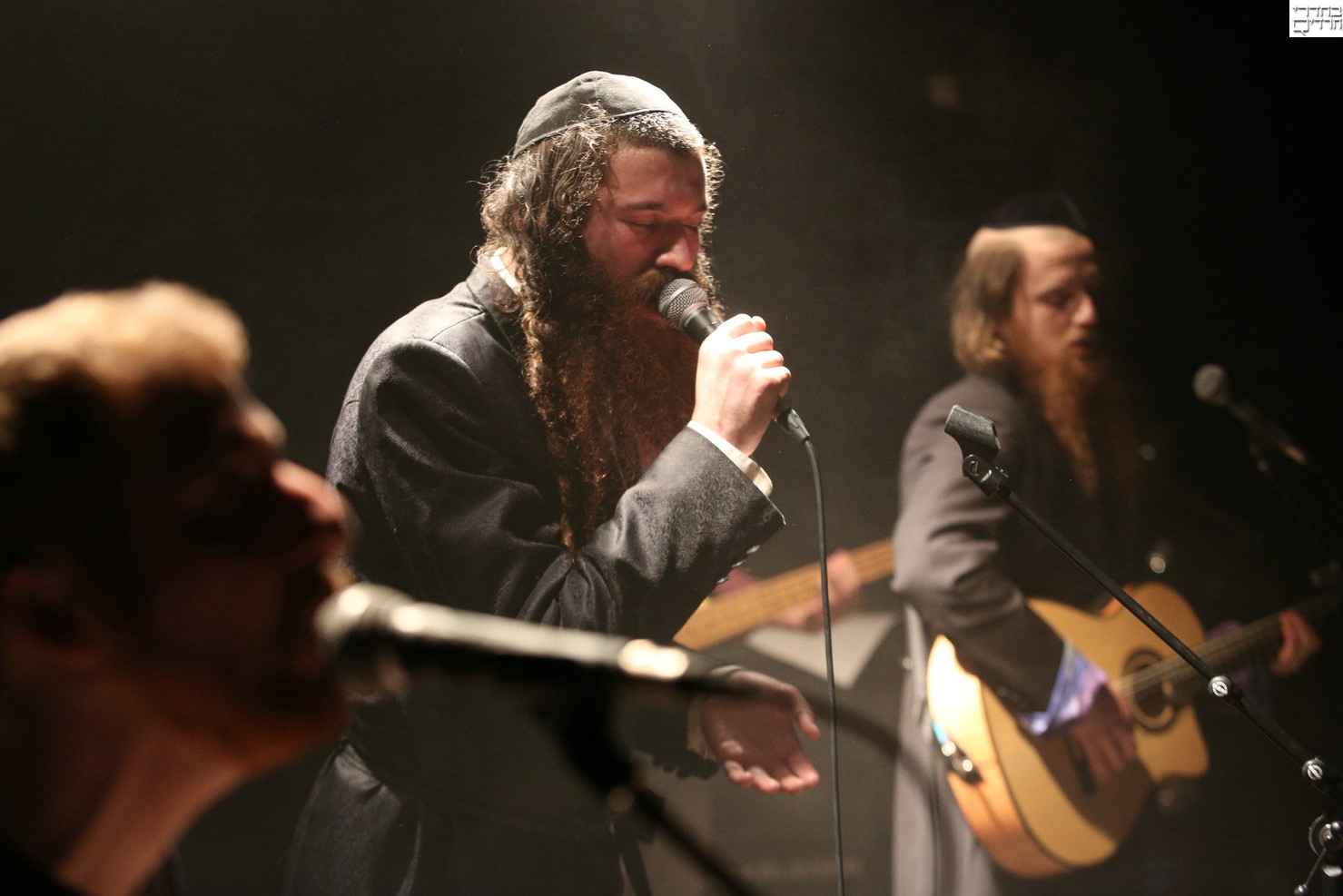
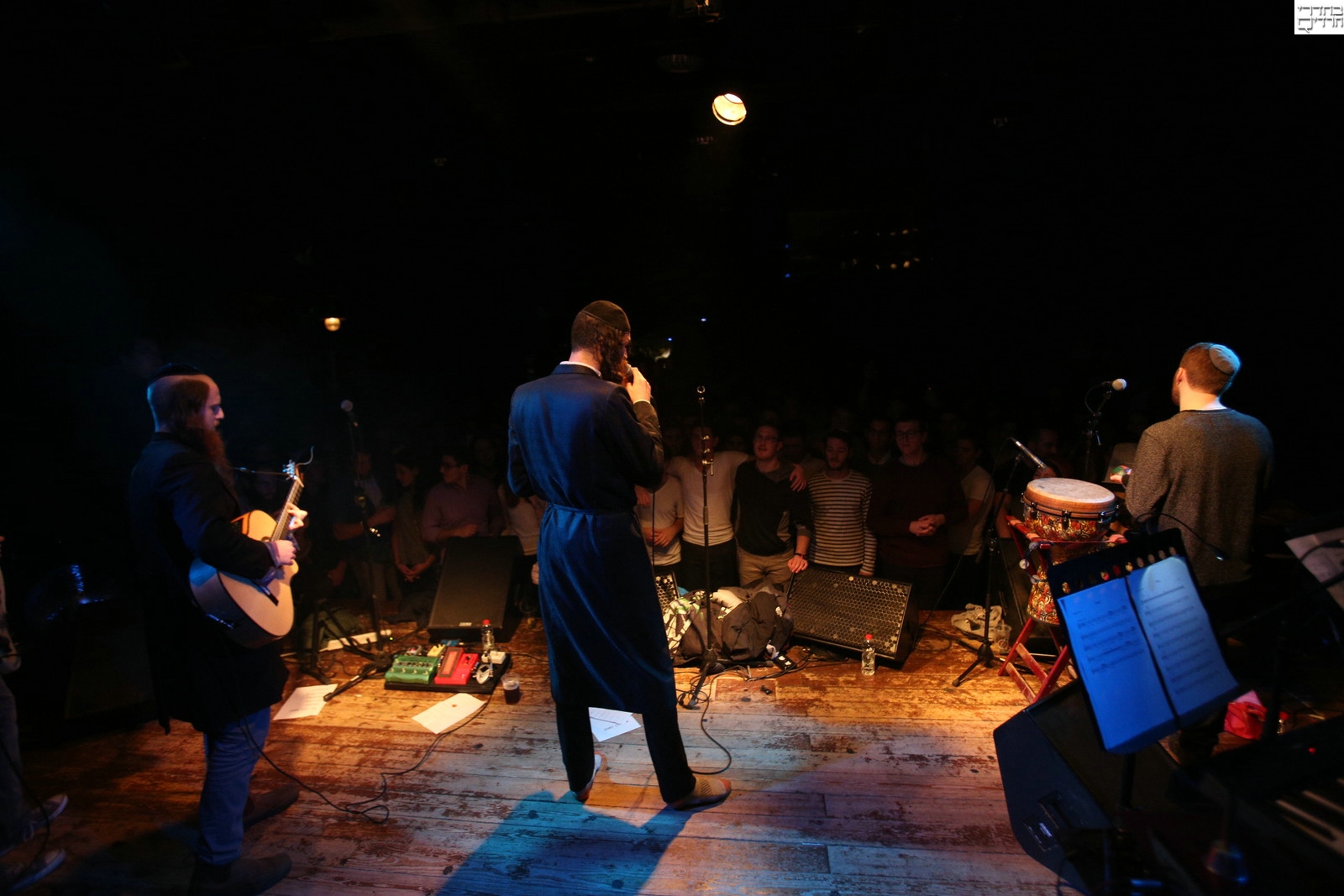
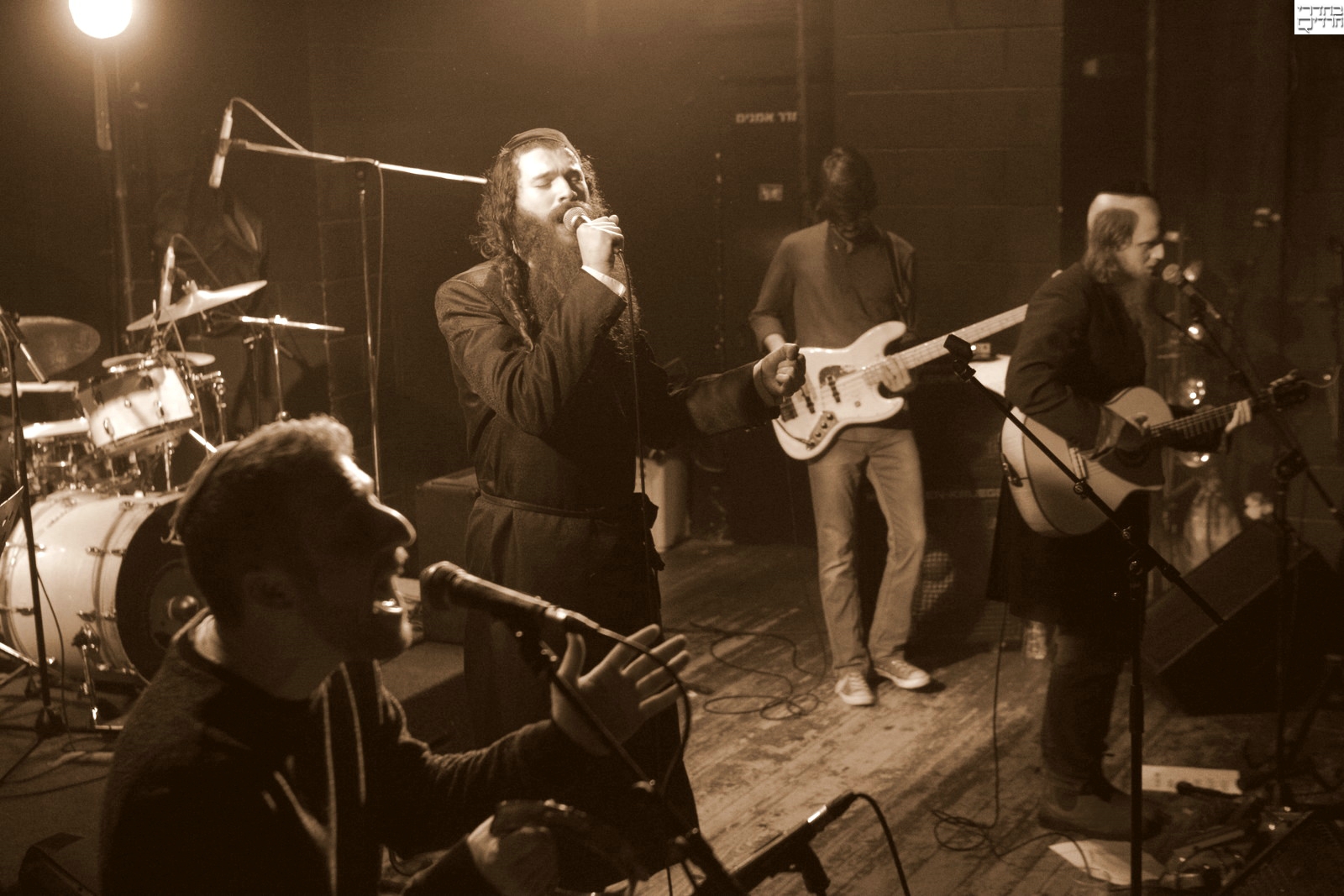
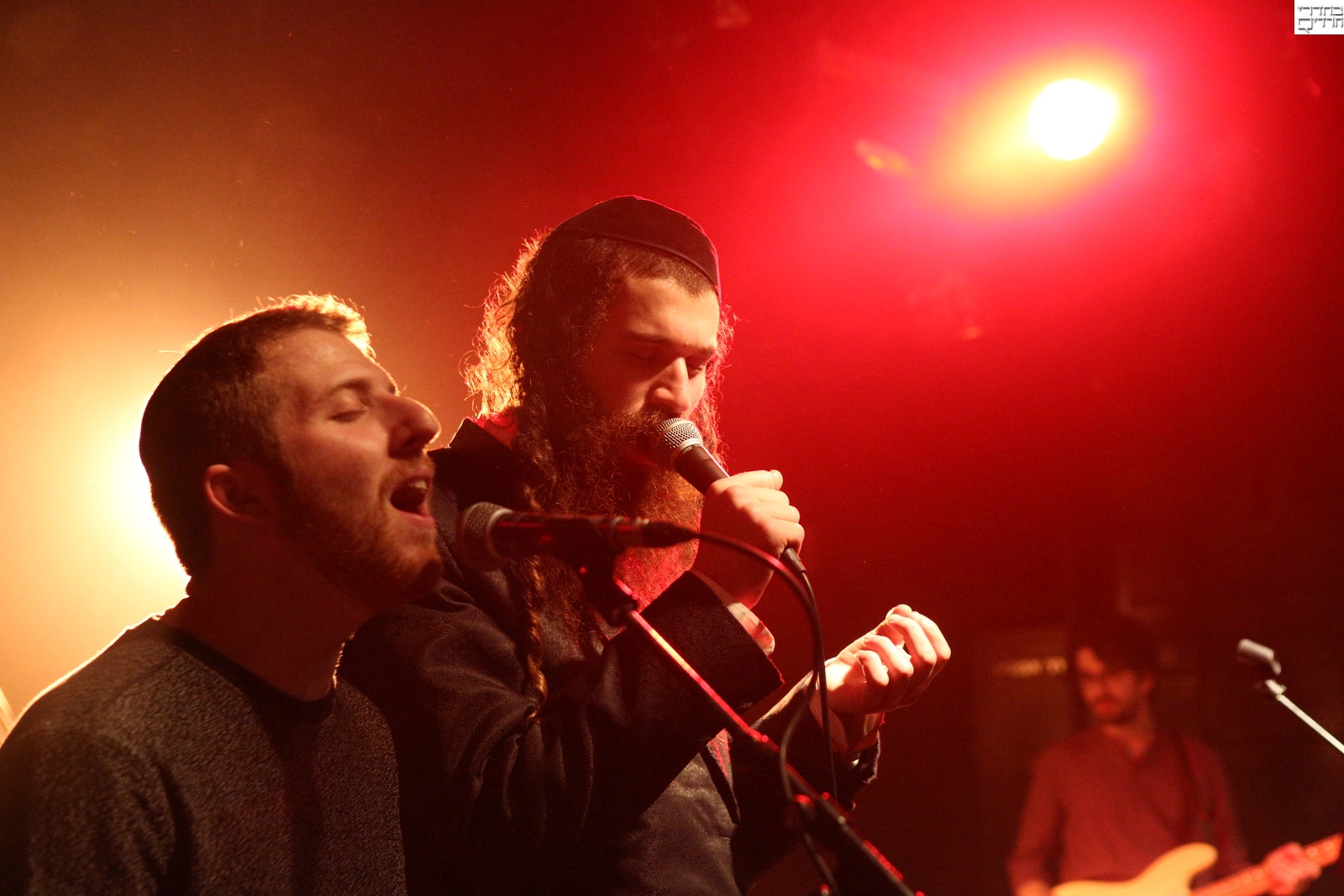
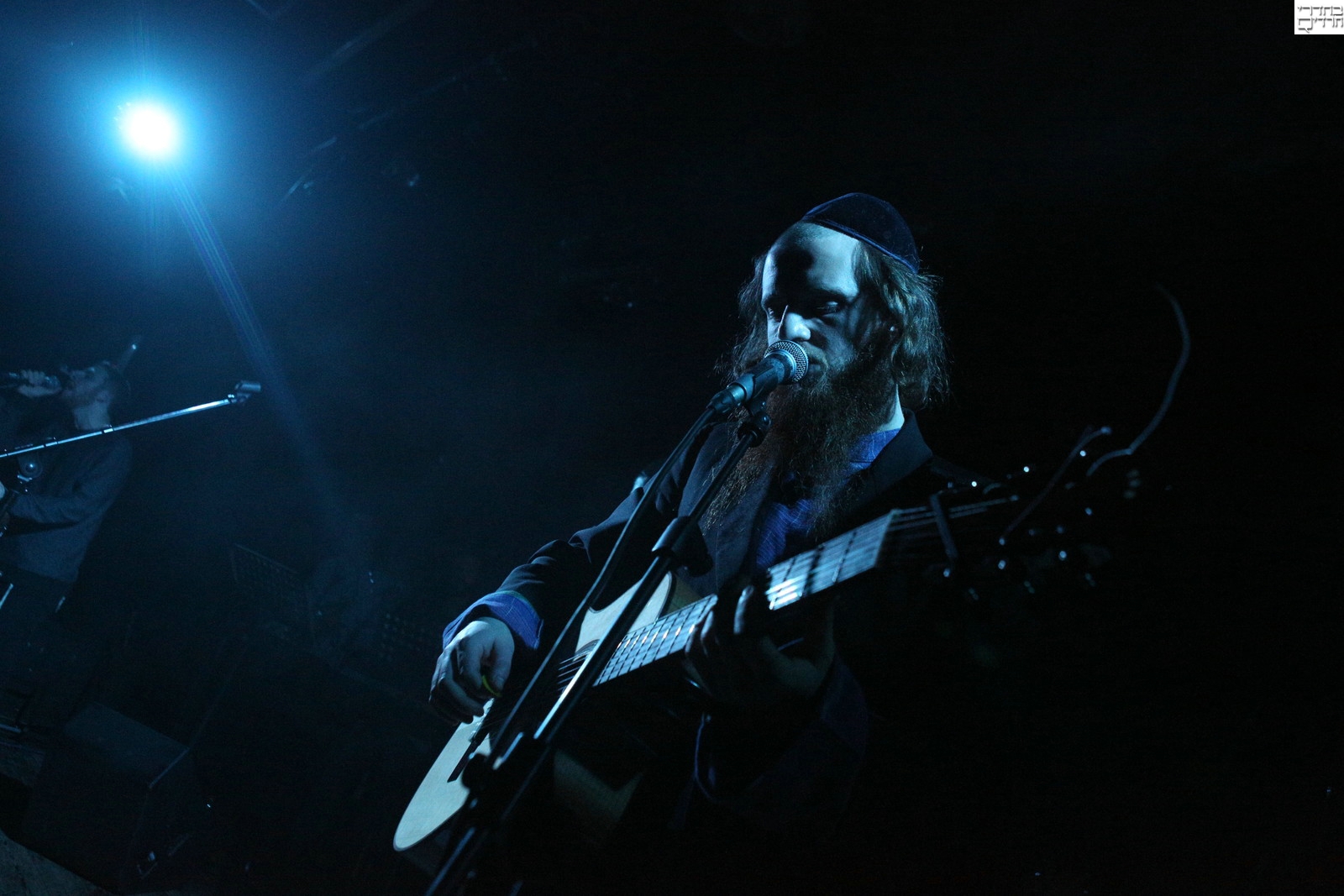
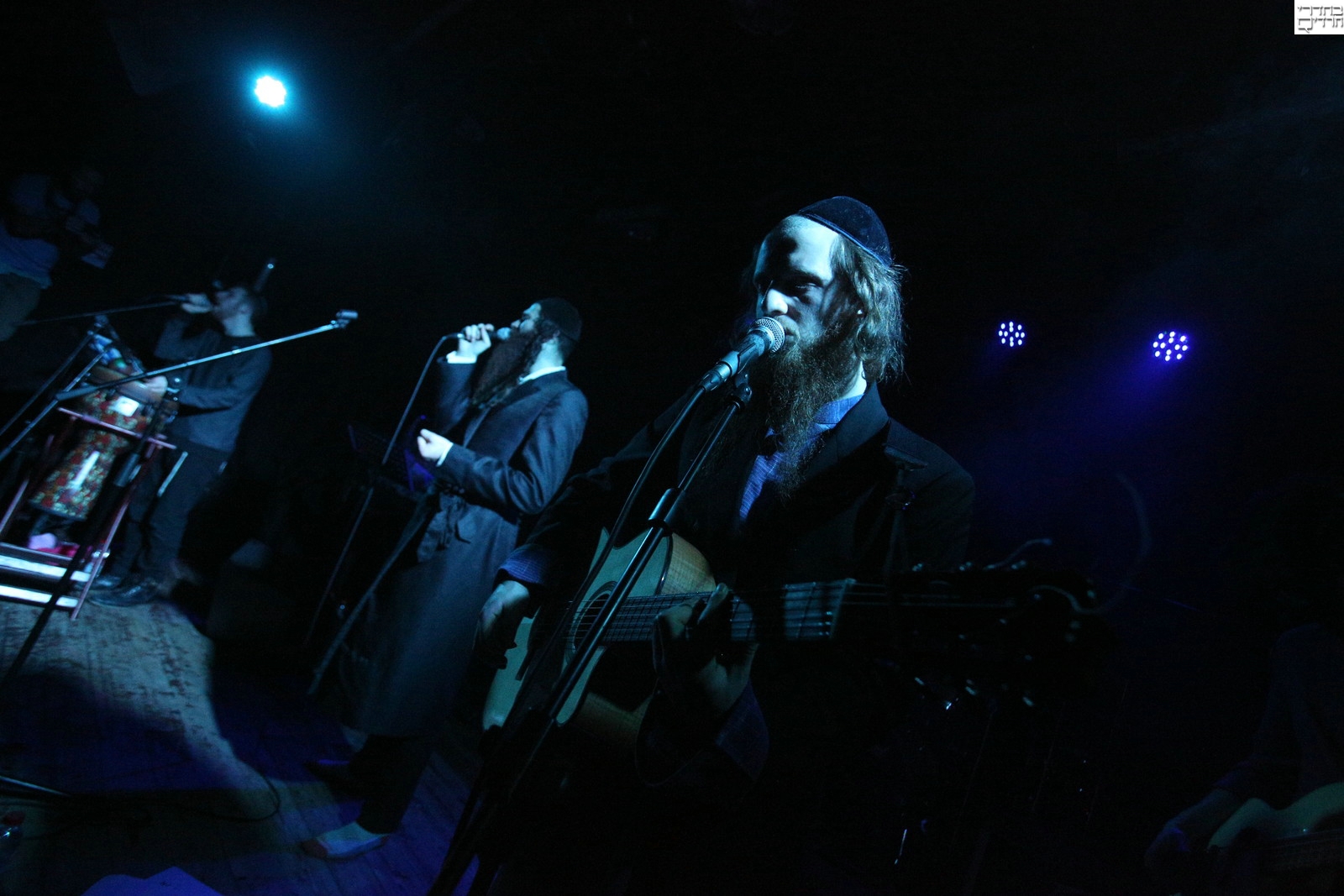
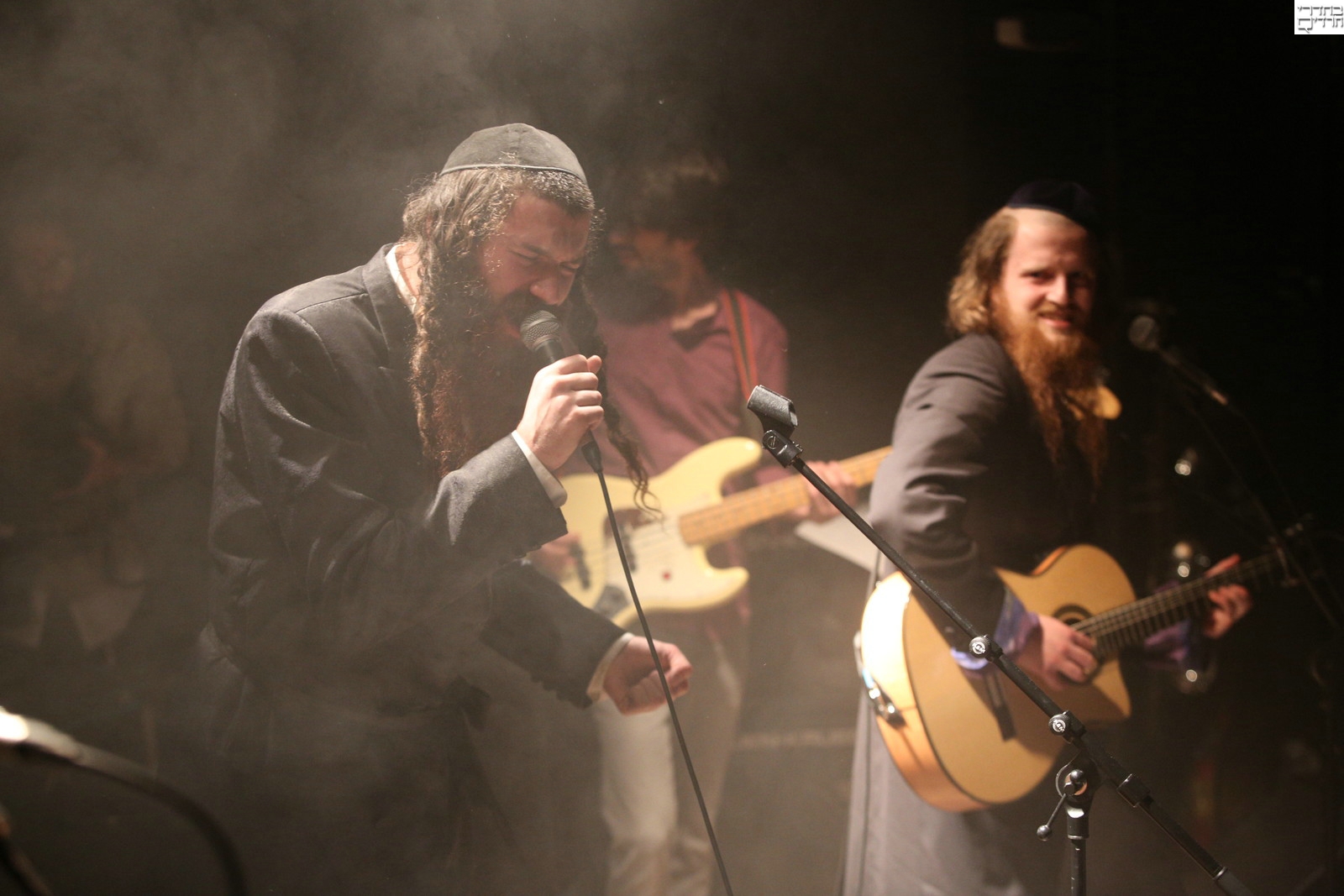
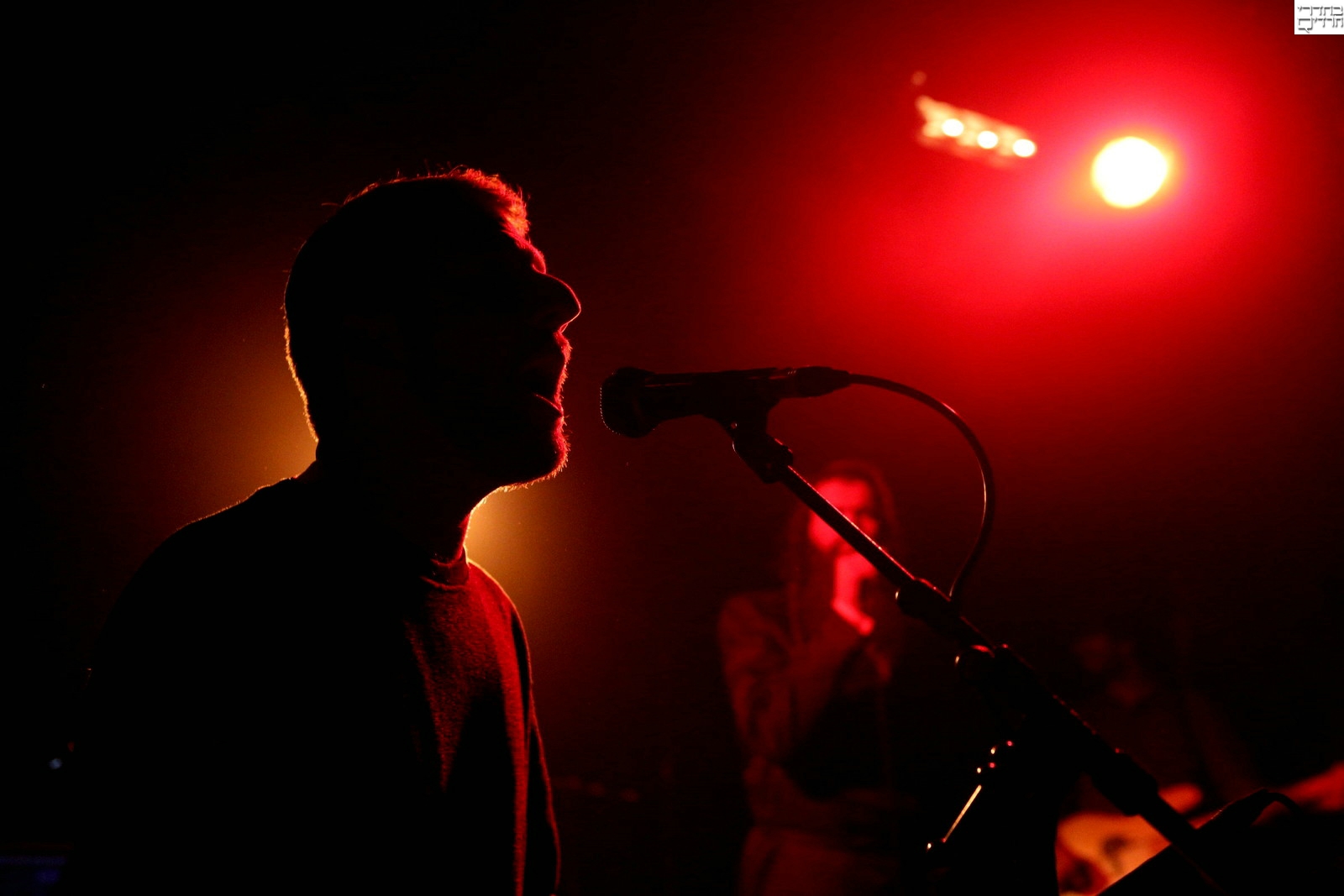
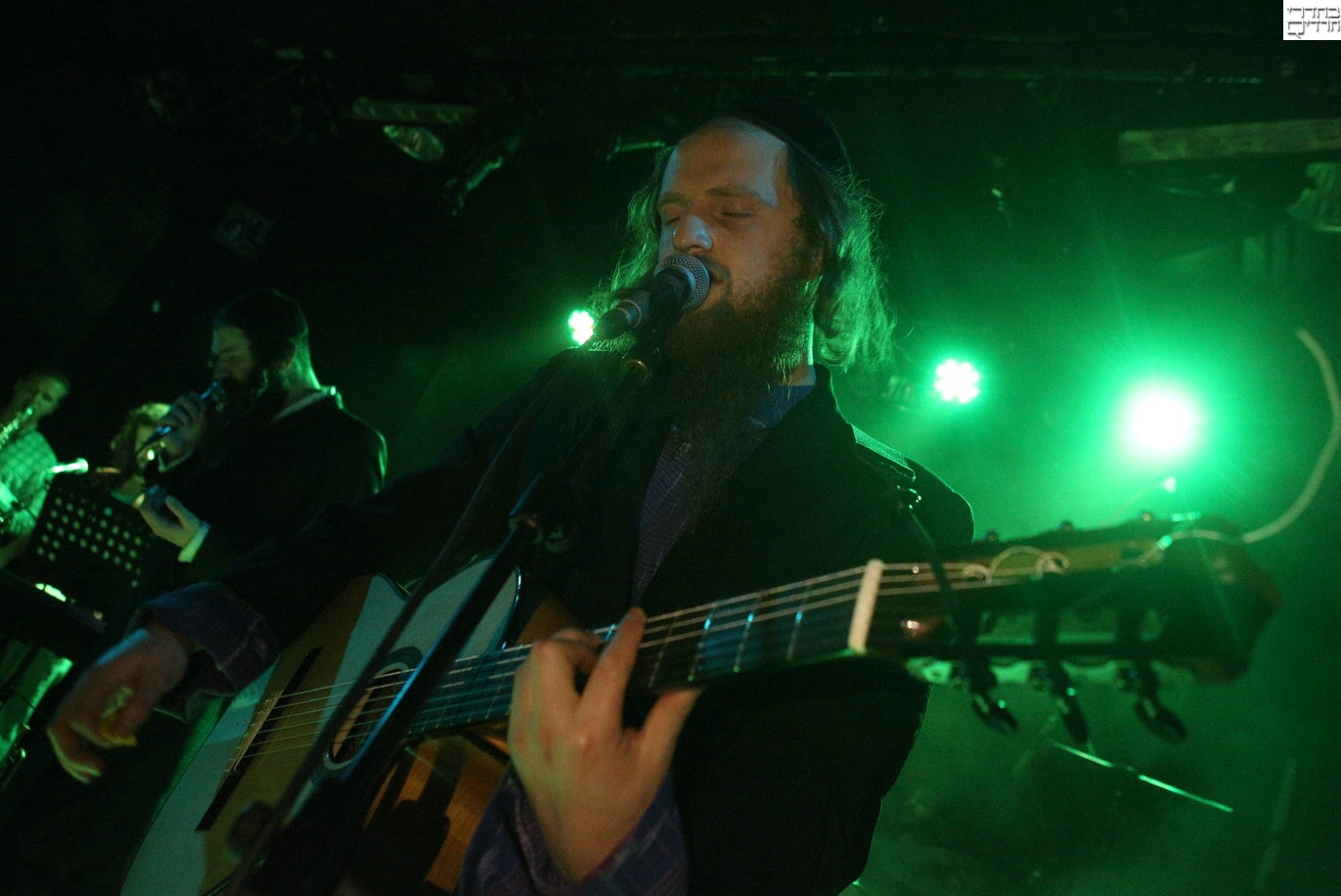
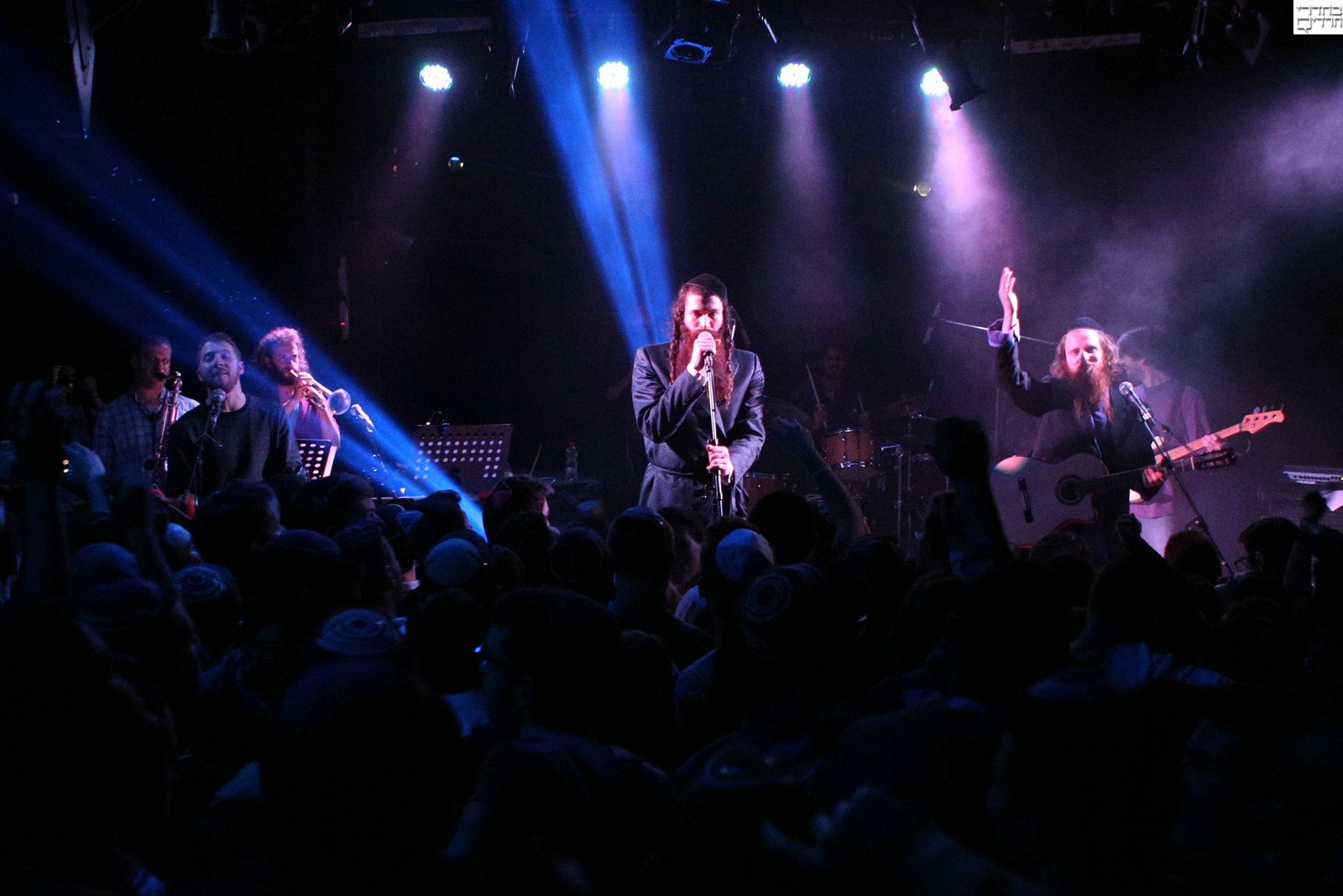
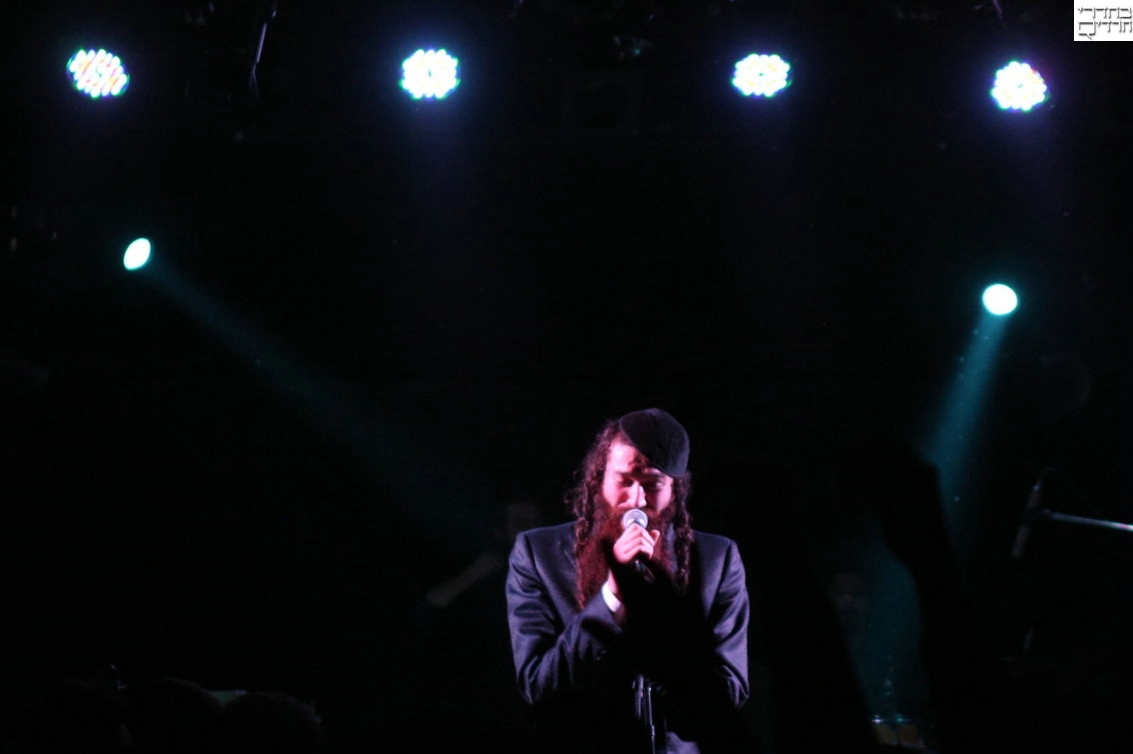
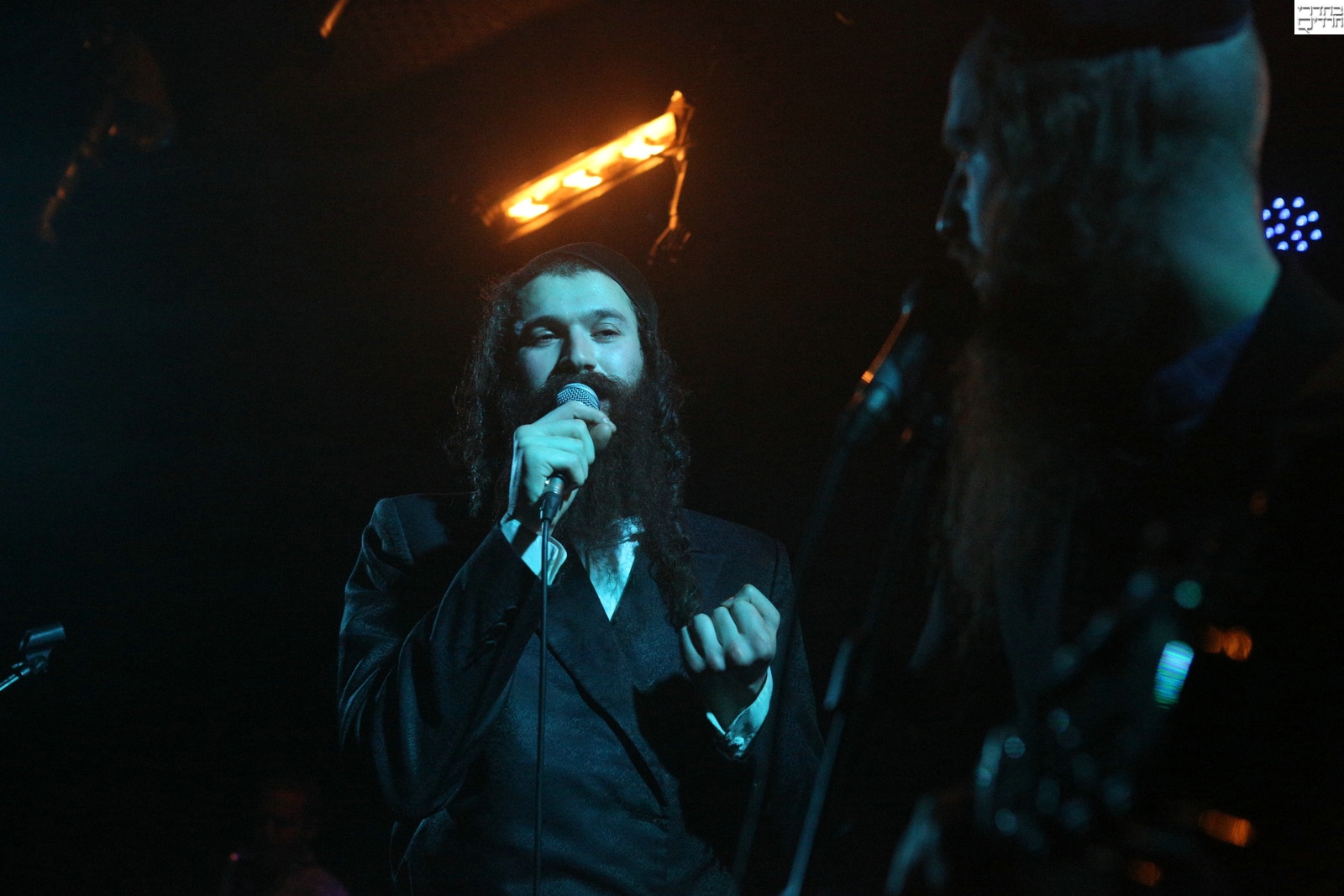
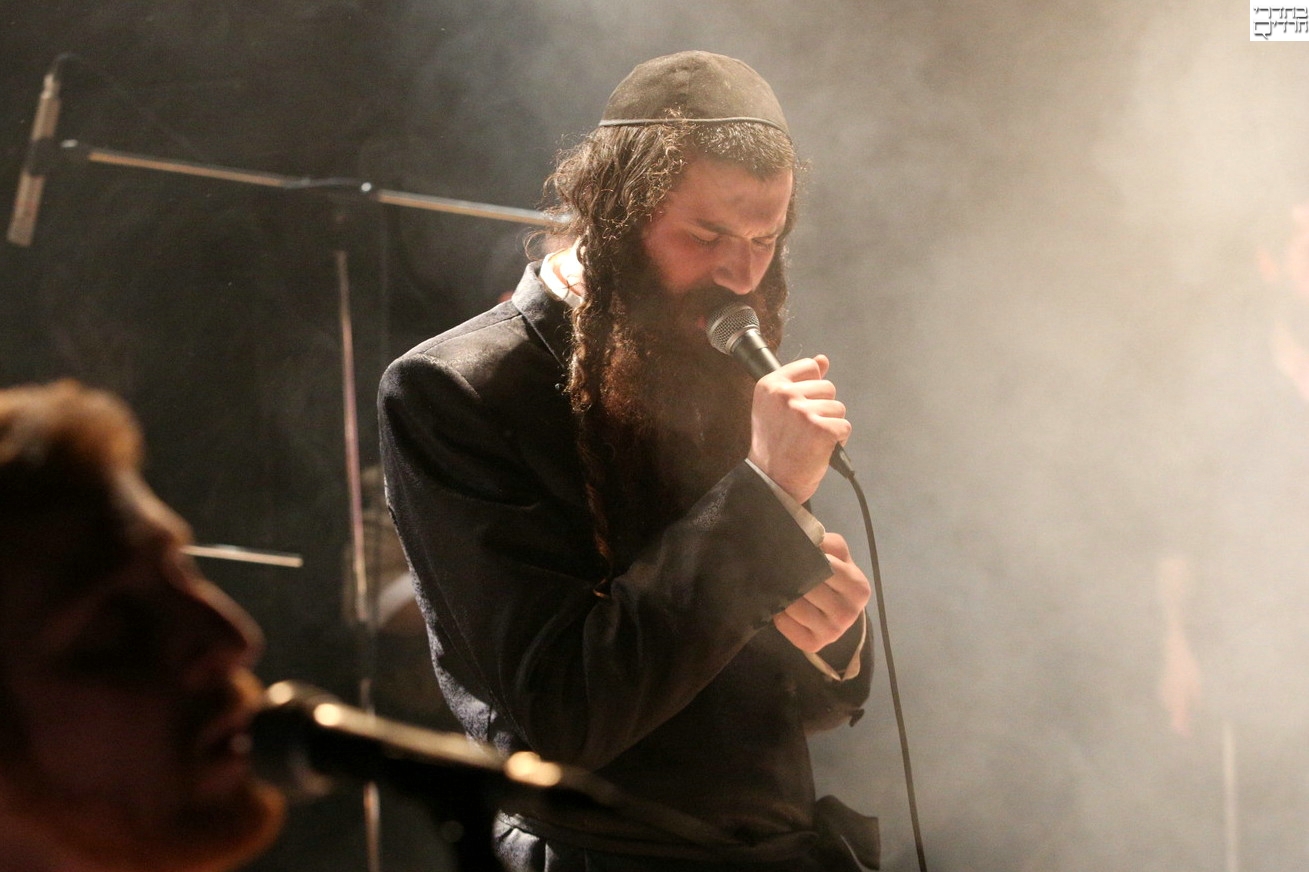
Most of you probably have not heard of Zushe. A trio of American friends from a remote village not far from New York, they met by chance one Shabboa a year ago, and since then it's history. The three - Elisha Mendi Moltek, Zecharya Goldschmidt and Shlomo Arye Gissin, are now in Israel on tour, and tonight is their last performance, after which they fly back across the ocean.
ראיון מיוחד עם להקת זושא
Outside the performance hall CDs and accessories of the band are sold. On stage, the mesmerizing trio performs, accompanied by other instruments. The audience is with them, that's quite obvious. There is, in this music, something mystical. Some of the audience closes its eyes in concentration, others are flushed to the end. Rhythms change, scales change from D minor to La Major, but the dveikus is always there. They manage to enchant for two hours, the audience knows all the hits of "Zushe", with 'Mashiach', the band's flagship song, reigning above all. There is no doubt that this spectacular phenomenon obliges one to understand its roots properly.
I meet them shortly before the performance, at the artists' cramped room of "Yellow Submarine", a place that ordinarily hosts regular concerts for the general public. Tonight it's hosting "Zushe". The trio sits down on the mysterious neon-lit couch, and gives a different and unique interview to Behadrey Haredim.
"The name Zushe, named in honor of Rebbe Zushe of Anipoli," begins Zecharya Goldschmidt, "the special stories attributed to him spoke to us very much. We got a whole Torah from him, each one is something special, and something unique, so, whoever you are - our story is this: to be special, to live together but not forget that each one is something special."
At this stage of the interview, they are joined by two other band members. They sit gently by Zechariah, and chant in two voices the melody of the Baal Shem Tov. A soft and precise performance, used as background music, fascinating behind Zechariah's words. When Zechariah finishes his answer, the tune becomes a big light, and all members join together in singing. They sing a clean, polished tune, with few voices, painfully accurate.
When you hear the unique music of "Zushe", one finds a fascinating mix of Jewish music with world music, reggae jazz and folk. To the Israeli – Haredi ear, Zushe's music would be a bit difficult to digest for the first time, as it causes an ambivalent attitude: on the one hand orthodox Jews who sing words from the scriptures with lots of fire in their eyes, but on the other hand combine motifs that are unknown in the Chassidic field of "Yada'ati" or "Hastora".
"First of all we are good friends," says Shlomo Arye, who is the band's singer. "Before anything else, after all, and all in all," says Zechariah. "We make music of a Hasidic soul," they suggest, "Melodies whose good point is their root. Simple melodies of the soul. People out there find it difficult to accept the simple stuff. Smart people are familiar with many things and complicated wisdoms - but lose the simplest thing: faith in Hakadosh Baruch Hu. That's the main thing, it's the soil of our lives. Even the Gemora in Brachos says that things which are lofty, like prayer, are disdained by people."
When I tell Sholomo Arye says he's responsible for most of the music of the band, he becomes modest. "He's a composer", says the lead singer as a gesture with his finger up, "He is both the King of the universe and the composer of the world, we're just trying to be a conduit to pass it on".
Zushe refuse to mark a clear target audience - "We are catering to the Mevakshei Hashem, audiences that want. Everyone who wants - we want. We do not force anyone to hear us. Whoever finds our music speaks to him - we talk to him." At this point, the members refer to the various splits in the Jewish and Haredi community: "Our direction is to make music speak for all Jews. We are trying to connect everyone to the golden road." This is the trait of Tiferet, like Yaakov Avinu. Just as in tragic situations in history, the enemies yimach shemam, like Hitler, did not make a distinction between one Jew and another, so too in good cases, lehavdil, we need to remember that no matter where we come from, we come from Hashem, that's the important thing. We are one family. How can one make a distinction between Jews at all, to make "Agudos, agudos" - that is, in fact, exile. We do not understand how one can discriminate between Jews. That is invalid".
This answer makes me see the outer difference between the band members: Goldschmidt and Gissin look Breslev Hasidim in all respects, while Moltek, the third band member, has a knitted kippa. They take the matter jokingly and exchange kippas. "What does it matter, why look on the outside," they say, and Moltek presses to his cheek the curling peyos of Gisin: "Is it okay now?" He jokes. "The most important is the pnimius, everything else isn't of interest, our goal is to create unity, it's our daily goal".
"We will be happy to appear before the Haredi community, and to present our music in a pleasant way," they say. "For Klal Israel we are willing to do anything. We'll also be happy to perform in Beis Hamikdosh".
הכירו את השם הכי חם בז\




















תגובות
{{ comment.number }}.
הגב לתגובה זו
{{ comment.date_parsed }}
{{ comment.num_likes }}
{{ comment.num_dislikes }}
{{ reply.date_parsed }}
{{ reply.num_likes }}
{{ reply.num_dislikes }}



הוספת תגובה
לכתבה זו טרם התפרסמו תגובות